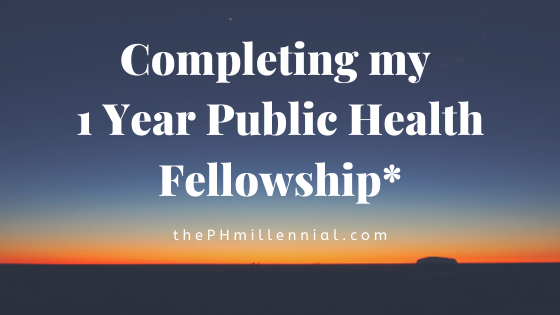Can you believe that my 1 year public health fellowship (community health fellowship) has come passed a year? It technically ended June 10th, 2020 – so its almost my year and 1 monthiversary! Though I have been blessed to continue to work in my role having extended my contract while I search for a full time position*. This also means that it has almost been a year since I started this website – time surely does fly.
I am really appreciative of this experience and for the opportunity to extend my contract while I am job searching amidst a global pandemic. Not only this, but my supervisor has transitioned out of her role with another colleague taking on her position in the interim. What’s most interesting to me is that right now I am the person with the most program evaluation skills in the organization.
I’m surely going to take this shift in capacity of the organization to try to contribute more meaningfully.
*I am still currently employed with them on an extended contract.
Support The Public Health Millennial on BuyMeACoffee
(Related: Career Chat With The Public Health Millennial)

Takeaways from My Evaluation
1) I Need To Speak Up More
I think this comes back to the imposter syndrome. My boss told me that any time I did speak up and my perspective was appreciated. But she thought I could have used my voice some more.
You know I would tell myself that this meeting I would contribute more to, but then there is that voice in your head. That little voice that keeps you from making that contribution during that little pause or just speaking up in general. I know I personally could have done better in this and I’m going to make it a point to improve on this for the duration of my fellowship.
I don’t think it was clearly as apparent how uninvolved I was in some meetings. I think during my time of learning and just really sitting down and listening to the conversations to understand how things worked has made me a little too passive. I honestly believe too often we have worthwhile perspectives, information or questions that we can share to enhance discussion, but don’t do so because we are unaware of our own value.
I look forward to using the remaining weeks/months to unlearn my passive approach in meetings. And I’ll be sure to ensure that I am using my voice at every table I get to sit at. We have to make it a point to have the confidence to speak up and voice our perspectives. That is the only way that they will be heard – let’s all work to share our perspectives in collective projects (which is a lot of public health).
(Related: Overcoming Imposter Syndrome)
2) I Do Good Program Management Work
I was brought in to my fellowship to mostly help in three areas primarily: with the Community Health Needs Assessment and specifically leading and managing the Photovoice component; assisting with program evaluation; and research and development of reports.
Though I have not gotten to use the total capacity of my program management skills just yet, I definitely have fine tuned how I approach projects. I think I have also been able to better learn how to work with competing task and shifting deadlines and urgency very well. I would say that my project management skills are a lot better, but my program skills will grow as I get to manage more persons in my career or professional life.
Though I’m not sure just how much program management I will need in my next role, it is such a great skill to have. And typically it’s hard to get real life experience with program management in undergraduate or graduate school – this will be a huge plus in your career. Even if it’s just project management skills, try to get these skills during school as many others frankly don’t have the opportunity to.
3) I Scored High Team Organizational Scores
This is considering the interpersonal skills, teamwork skills, and how my work aligned with the organizations mission and values. I could be forgetting something else, but you get the point.
Working in this environment where a team approach to many things was appreciated and apart of the culture really helped me to align with the organization. Being able to work with such fantastic people working to improve complex systems, advocate for policy change and really align with the community was (is) a tremendous experience.
If it’s one thing outside of the “work work” that I learnt this year is that having a place that supports you, where the culture matches yours, and the work is meaningful you really are able to excel and enjoy the work while doing so. Make sure that when you are interviewing, you are able to get a realistic feel for what the work environment and culture in the organization is like – you don’t want to feel out of place or worse be in a toxic workplace.
My Advice to Students in Public Health
Have a Plan
More now than ever, we all need to be ensuring we have a solid plan. This plan does not have to be perfect and can be flexible depending on how your skills and passions change over time.
Whether you’re an undergraduate, graduate student or a recent graduate make sure you take some time to either write down or have a visual plan. Know what sort of career path you want to take so that you can make decisions that align and help you to get into that career path. You can always pivot along your path so having a plan helps to align you with what skillsets you need.
Transferable skills that can be used in various roles is so important for new public health professionals. Especially as the job market has been devastating during the pandemic. Yes, there are lots of contact tracer jobs, but these are not careers. However, you can pick up some skillsets that might suite your career trajectory.
Being flexible in the jobs that you take just because they are less jobs might be the norm for the next couple years.
Networking
Networking is going to be key now more than ever. You should take on any opportunity to learn about job positions and get mentorship or knowledge from others. Building up your network so that you can more organically get jobs will surely set you apart in your career journey.
Start small and continue to build your network. Start with peers, professors, coworkers and bosses. Developing and creating a network . A benefit of having a network is that it increases your opportunities. Your opportunities in jobs, in learning, in mentorship, in friendships, in building capacity to help others. Networks can also be used to help support you throughout your journey be offering advice or just to help morally when the going gets tough.
Join
- LinkedIn & LinkedIn Groups
- Associations like the American Public Health Association
- Other Professional Networking Group
Make sure that you are on LinkedIn as it is the number one professional platform. Whether you like it or not, you have a personal brand. And the sooner you take control of this brand and build it how you want, the better off you’ll be.
Look for Opportunities to Set Yourself Apart
I found so much value in my fellowship experience and I hope I can leverage the experiences for in my next position. Right now when the job market has shrunk and many opportunities have dried up, the ones that are getting ahead are either the ones that networked well or the ones that took on opportunities and experiences to set oneself apart.
Throughout your program and your career, you have to strive to do more than what is asked for. You have to go beyond and look for opportunities that can help your career trajectory. Everyone is going to have a degree, ask yourself what can you do to set yourself apart from someone with just a degree? What experiences can you take up to round out your academic knowledge and build on skill sets that will be important for furthering your career? Whether that be through leadership or applying public health in an innovative way. Having something that stands out among your peers and that you can reflect in your resume is and will be important for continued career success.
Please don’t go through your degree just doing the bare minimum. That is of course, unless you just want the bare minimum job or career. If you want to make the most out of career, then start from early and build up unique opportunities to set yourself apart.
(Here are all of My Fellowship Journey Post)
What the Future Has In Store
Thankfully, I have gotten a contract extension until September while I look for a job.
Obviously, I am searching and applying for jobs. Furthermore, I am continuing to expand my public health network. When I first got into my role, I should have intentionally kept networking and not only start when I knew I have to transition. I advise you do the same. Continually try to build up your network to help in the next step of your career.
The public health field is in an interesting time and ensuring you have a grasp of what’s going on and how things are changing will be important. So make sure that you are reading up on what’s happening from reputable sources. You could also gain this knowledge through networking. Leverage your networks through dialogue and informational interviews
Always have job search alerts on even when you aren’t actively looking for positions. This can help you to put a finger what sorts of roles are out there and how you can build important skills for your next career step. Modifying your job search as you go up or across the career ladder to focus on roles that you are more interested in can also be beneficial. It’s always a good idea to have your mind on the idea of growth into your next position.




Thanks for this amazing write-up Omari! I enjoyed hearing what you had to share and of your advice. I really like how you emphasized how the environment needs to be proper and supportive each individual as the individual can only do so much with his or her wish and role. Keep up the great work!
Best,
Samar
Appreciate you checking it out Samar! I shall keep on trying to provide value to those that are seeking it.
best,
Omari